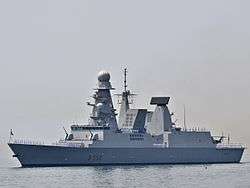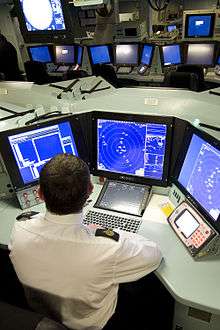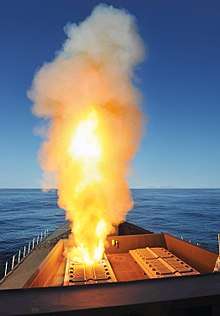PAAMS
The Principal Anti Air Missile System (PAAMS) is a joint programme developed by France, Italy and the United Kingdom for an integrated anti-aircraft warfare system. The prime contractor is EUROPAAMS, a joint venture between Eurosam (66%) and MBDA subsidiary UKAMS (33%). In the United Kingdom PAAMS has been given the designation Sea Viper.[1]

The PAAMS warfare system is in service with the Royal Navy, French Navy and the Italian Navy.
Background

PAAMS was originally intended to be deployed in the 'Common New Generation Frigate' (also known as the Horizon-class frigate) for the navies of the United Kingdom, France and Italy.[2] The French DGA placed a contract with EUROPAAMS on 11 August 1999 for the development production of the PAAMS warfare system along with the associated Long Range Radar (LRR) system. The contract included one PAAMS system and one LRR for each of the first British, French and Italian new class of warships. However irreconcilable differences in the design requirements led to the United Kingdom leaving the 'Common New Generation Frigate' project in October 1999. After withdrawing, Britain instead decided to pursue a national warship design, designated the 'Type 45 destroyer'. The United Kingdom remained committed to the PAAMS project.[3] As a result of efforts to achieve economies of scale, the PAAMS command system shares common architecture between the Horizon-class and Type 45 destroyers. On 28 January 2009, the PAAMS was given its official designation of Sea Viper by the Royal Navy.[1]
cost= £2.3 million per missile
PAAMS components
- PAAMS(S) — British variant with SAMPSON Multi-Function Radar (MFR)
- PAAMS(E) — French/Italian variant with EMPAR Multi-Function Radar
- Automatic Command and control system
- Consoles running Windows 2000 operating system
- Sylver Vertical Launching System
- MBDA Aster missiles:
- Aster 15, range; 1.7–30 km
- Aster 30, range; 3–120 km
Both variants of the PAAMS operate in conjunction with the S1850M Long Range Early Warning Radar.
Capabilities

PAAMS is designed to track, target and destroy a variety of high performance air threats, including saturation attacks of very low altitude, supersonic cruise missiles, fighter aircraft and UAVs. PAAMS can launch 8 missiles in under 10 seconds with its Sylver Vertical Launching System, and simultaneously guide up to 16 missiles at once.[4] The PAAMS(S) variant consists of both the SAMPSON and S1850M long range radars and is capable of tracking in excess of 1,000 targets at ranges of up-to 400 km. BAE Systems also claims that its SAMPSON radar has "excellent detection of stealth aircraft and missiles".[5] Nick Brown the editor-in-chief of Jane's International Defence Review was quoted as saying the Type 45 is "certainly one of the most advanced air defence ships in the world. The US Aegis system is similar, but Sea Viper is more advanced as it can engage multiple targets simultaneously."[6]
Testing
- During its first major warfare sea exercise aboard HMS Daring the ship's Combat Management System crashed while under simulated air attack due to a power failure and the ship lost use of its combat management system; the ship's crew reverted to use of binoculars to spot incoming airborne threats until the CMS had been restarted.[7]
- In 2009, two test firings of PAAMS in the British configuration from the Longbow trials barge failed due to "failures in the terminal phase of the engagement." It was believed that "production weaknesses" in a batch of Aster 30 missiles imported from France were to blame.[8]
- Beginning with HMS Dauntless in September 2010, all of the Royal Navy's Type 45 destroyers have successfully intercepted Mirach drones with Aster missiles at the Benbecula ranges off the Outer Hebrides, Scotland. Mirach is a 13 ft jet which flies at speeds of up to 600 mph (966 km/h) at altitudes as low as 10 ft (3m) or as high as 14,000 ft (4 km).[9][10][11]
- In April 2012, the Horizon-class frigate, Forbin, of the French Navy downed an American GQM-163 Coyote target simulating a sea-skimming supersonic anti-ship cruise missile traveling at Mach 2.5 (3000 km/h) with an altitude of less than 5 metres. It was the first time a European missile defence system destroyed a supersonic sea-skimming "missile". The trial was described as a "complex operational scenario".[12]
- In 2013, HMS Daring of the Royal Navy, demonstrated the ability of her Sea Viper system to detect and track at considerable range two medium range ballistic missiles at the Ronald Reagan Ballistic Missile Defense Test Site, in the Marshall Islands, US.[13][14]
- In May 2019, HMS Defender successfully used her Sea Viper system to destroy an incoming drone target as part of Exercise Formidable Shield.[15]
- In May 2019, French frigate FS Bretagne destroyed a supersonic missile going to more than Mach 2 (2400 km/h) with one of her Aster 15s during exercise Formidable Shield[16].
Operators
Current operators


- Type 45 destroyers - six ships

- Horizon-class frigates - two ships
- FREMM multipurpose frigates- eight ships

- Horizon-class frigates - two ships
- FREMM multipurpose frigates - ten ships
See also
References
- "Who dares wins - Royal Navy's newest warship arrives at her Portsmouth home" (Press release). BVT Surface Fleet. 28 January 2009. Archived from the original on 15 June 2009. Retrieved 28 January 2009.
- Nicoll, Alexander (1999-04-27). "National differences scupper frigate project". Financial Times.
- "Sampson flexes its muscles". Electronics Times. 1999-06-07.
- Eurosam: Naval Systems - Aster 15 & 30/PAAMS (Official Eurosam website), Retrieved February 2014.
- "Sampson Next Generation Multi-function Radar" (PDF). BAE Systems. 2011. Retrieved 5 August 2016.
- Editor, Paul Vale Front Page; Post, The Huffington (3 February 2012). "PICTURES: The Royal Navy's £1bn Falklands Deterrent". huffingtonpost.co.uk. Retrieved 4 August 2016.CS1 maint: extra text: authors list (link)
- "Building Britain's Ultimate Warship - Episode Guide - All 4". channel4.com. Retrieved 4 August 2016.
- Barrie, Douglas (2010-05-07). "MBDA Prepares For Further Sea Viper Testing". Aerospace Daily & Defense Report.
- "HMS Daring fires Sea Viper for first time". www.gov.uk. Ministry of Defence. 19 May 2011. Retrieved 5 August 2016.
- "HMS Diamond fires Sea Viper missile for first time". www.gov.uk. Ministry of Defence. 1 May 2012. Retrieved 5 August 2016.
- "Defender ready to live up to her name after successful first Sea Viper firing". navynews.co.uk. Navy News. 16 May 2014. Archived from the original on 17 October 2017. Retrieved 5 August 2016.
- "Interception d'une cible supersonique évoluant au ras de l'eau". defense.gouv.fr. French Ministry of Defence. 5 April 2012. Retrieved 31 July 2016.
- "Improving the Type 45 Destroyer - Missile Armament". ukdefencejournal.org.uk. Retrieved April 6, 2020.
- "Sea Viper (ASTER)". thinkdefence.co.uk. Retrieved April 6, 2020.
- ""HMS DEFENDER SHOWS HER POWER WITH MISSILE FIRING"". https://www.royalnavy.mod.uk. Royal Navy. 2019-05-20. Retrieved 21 May 2019. External link in
|website=(help) - https://www.defense.gouv.fr/marine/actu-marine/tir-aster-15-la-fremm-bretagne-intercepte-une-cible-supersonique